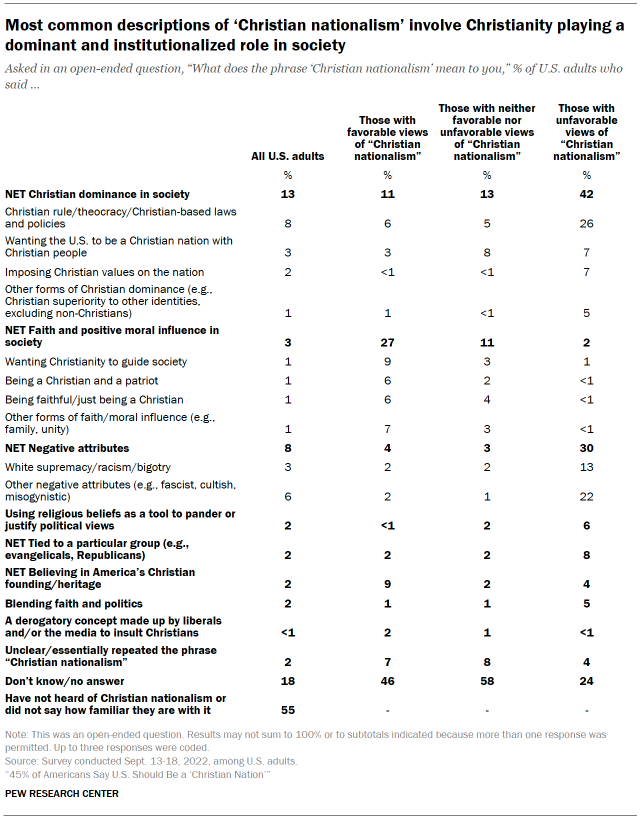Most Americans think the founders of America intended for the U.S. to be a “Christian nation,” more than four-in-ten think the United States should be a Christian nation, and a third say the country is a Christian nation today. However, Americans’ views of what it means to be a Christian nation are wide-ranging and often ambiguous. To some, being a Christian nation implies Christian-based laws and governance. For others it means the subtle guidance of Christian beliefs and values in everyday life, or even simply a population with faith in something bigger.
Many Americans are unfamiliar with the concept of “Christian nationalism,” and among those who have heard of it, more people express an unfavorable view of Christian nationalism than say they have a favorable impression of it. Nevertheless, like the descriptions of Christian nation, Americans’ views of Christian nationalism envision varying levels of Christian influence on the nation, ranging from strict theocratic rule to merely embracing moral values such as helping others.
This chapter explores these and other findings regarding the public’s views of the U.S. as a Christian nation and of its attitudes toward Christian nationalism.
Americans are divided about Christianity’s role in the country, have diverse ideas about what it means to be a ‘Christian nation’
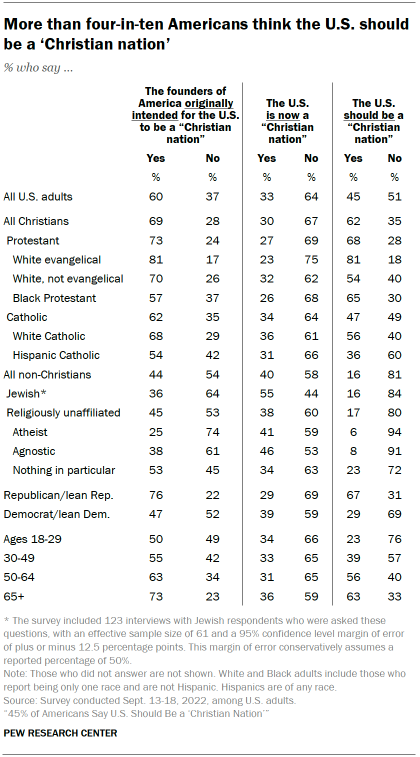
The survey asked half of respondents whether they think the founders “originally intended” for the United States to be a Christian nation, whether the country “is now” a Christian nation, and whether it “should be” a Christian nation.4
Most adults (60%) say the founders of the United States originally intended for it to be a Christian nation. A third say the U.S. is currently a Christian nation. And more than four-in-ten Americans (45%) say the country should be a Christian nation.
Compared with non-Christians, Christians are much more likely to say the founders intended for the U.S. to be a Christian nation (69% vs. 44%) and that it should be a Christian nation (62% vs. 16%). However, Christians are less likely than non-Christians to say the U.S. currently is a Christian nation (30% vs. 40%).
Eight-in-ten White evangelical Protestants (81%) say the country’s founders intended it to be a Christian nation, making them the Christian group most heavily inclined toward this view. Black Protestants (57%) and Hispanic Catholics (54%) are the least likely Christians to hold this view, though half or more in both of these groups also say the founders intended the U.S. to be a Christian nation.
The vast majority of White evangelical Protestants (81%) say the U.S. should be a Christian nation, as do roughly two-thirds of Black Protestants (65%). Only about a third of Hispanic Catholics (36%) share this view.
There also are sizable differences between political parties on the place of Christianity in the United States’ national identity. Two-thirds of Republicans and independents who lean toward the GOP (67%) say the U.S. should be a Christian nation – more than double the share of Democrats and Democratic leaners with the same view (29%). Republicans are also far more likely than Democrats to say the founders intended for the country to be a Christian nation (76% vs. 47%), and they are less likely to think the country is presently a Christian nation (29% vs. 39%).
Additionally, perspectives vary substantially on these questions among Americans of different age groups. About three-quarters of Americans ages 65 and older (73%) think the founders intended for the U.S. to be a Christian nation, compared with half of those ages 18 to 29. And roughly six-in-ten Americans ages 65 and older think the U.S. should be a Christian nation, compared with about a quarter of adults under 30. Similar shares across age groups think the country is currently a Christian nation.
Respondents who received these questions were also asked the open-ended question, “In your own words, what does the phrase ‘Christian nation’ mean to you?” Overall, Americans express widely varying ideas of what being a Christian nation means.
A third of Americans (34%) express in some way that being a Christian nation involves the general guidance of Christian beliefs and values in society. Within this category, some say it specifically means people having faith in God (11% of all respondents) or Jesus Christ (7%), while others say a Christian nation is one in which the majority of the population is Christian (7%). These types of descriptions are much more common among those who say the U.S. should be a Christian nation compared with those who think the U.S. should not be a Christian nation (48% vs. 23%).
One respondent with this understanding defines a Christian nation as “people that believe in God and follow his word and beliefs.” Another says, “A nation that loves God and others with no discrimination.” Many respondents also express some version of “in God we trust” or “one nation under God.”
Another 12% of the public describes a Christian nation in terms of being guided by beliefs and values, but without specifically referencing God or Christian concepts. They describe a Christian nation as one where, for example, “Overall, the nation as a whole has a basic faith and believes all people, regardless of race or creed, be treated equally. A solid belief in our humanity and willingness to act upon it.” Others reference “tolerance, morals and ethics,” “caring and loving,” “a nation of faith,” and “love all. No matter of differences.” One-in-five Americans who think the U.S. should be a Christian nation (21%) express this understanding, compared with only 4% of those who do not think the U.S. should be a Christian nation.
About one-in-five Americans (18%) describe a Christian nation as having Christian-based laws and governance. Those who think the U.S. should not be a Christian nation are far more likely than those who think the U.S. should be a Christian nation to express this view (30% vs. 6%).
Often, these descriptions are negative. One respondent describes a Christian nation as “being controlled by only people of the Christian faith.” Others say, “To me it means theocracy,” or that a Christian nation means “imposing incredibly selective and often untrue to their own faith ‘rules’ on everyone else, out of a perverse need to control others and feel better about themselves.” One respondent describes a Christian nation as “one whose laws are in line with the Christian faith at the exclusion of other values or opinions.”
In addition to negative views about theocracy, another 11% use other specific negative terms to describe the concept of a Christian nation, including 5% who mention things like bigotry, persecution or White supremacy, and 3% who mention authoritarianism or similar ideas. Virtually all respondents in this category say the U.S. should not be a Christian nation.
At the same time, however, many Americans express positive views of a Christian nation with Christian-based governance. For example, one respondent said, “A nation that honors God and Jesus Christ, and doesn’t make laws that fly in the face of what God has said, and certainly doesn’t persecute Christians for following what they believe the Bible tells them about issues such as homosexuality and abortion being sinful.”
A notable theme throughout respondents’ descriptions of a Christian nation is their ambiguity. It is often unclear exactly how much institutional influence and control people attribute to Christianity in their responses. For example, respondents describe a Christian nation as “a nation that upholds the teachings of God through Jesus Christ,” “a nation that follows biblical values,” and one that “follows the principles of Christianity upon which it was founded.” Responses like these do not clearly spell out whether Christianity would hold an official and privileged place, or rather serve as a more general source of moral guidance. Only responses that specifically mention laws, policies, governance or other national leadership are coded in the “Christian-based laws/governance” category.
Some respondents convey awareness that “Christian nation” can take on a variety of meanings. According to one, “It should mean they follow the teachings of Christ. However, now it can mean extremist, money-loaded, White nationalists pushing their agenda.” Another claims, “It should mean that the nation is guided by the teachings of Christ, but most Christian politicians wish to exploit religion in a manner Christ would not approve.” Several respondents suggest that its meaning recently changed: “I used to think it was a positive view, but now with the MAGA crowd, I view it as racist, homophobic, anti-woman.”
Similarly, some respondents see the idea of a Christian nation as a political tool. As one respondent says, “To me it means pandering to a subset of our population to get money and votes.” Other descriptions in this category include “ruled by religious propaganda,” “pretending to be Christian, but yet not being Christian, in order to gain politically,” “being used for political purposes,” and “a bunch of hypocrites who use God as a shield to do/say whacky, zany things and everyone’s supposed to brush it off.”
Another 1% of Americans associate the idea of a Christian nation with the notion that America was founded on Christian principles, and that Christian morals and values are a part of its heritage and culture.
Apart from these descriptions, 1% of Americans associate the idea of a Christian nation with conservative groups, such as Republicans, evangelicals and the right wing.
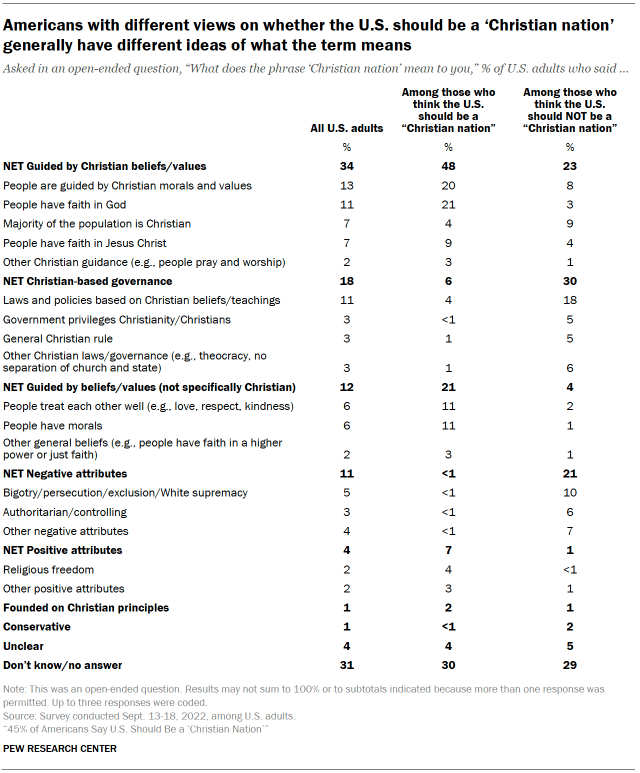
More have negative than positive view of ‘Christian nationalism,’ and many are unfamiliar with the term
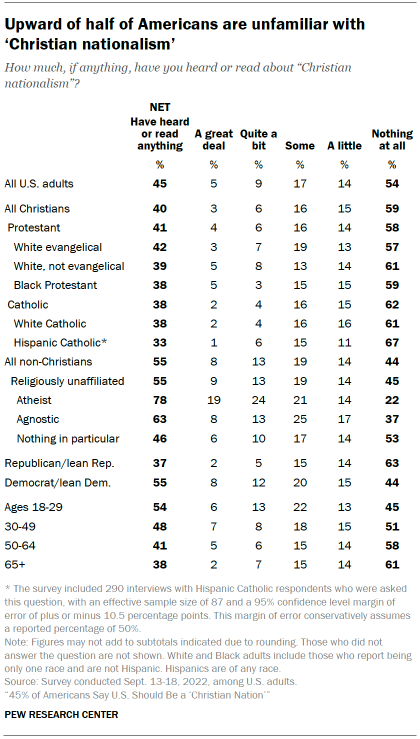
The half of survey respondents who were not asked the questions about America as a “Christian nation” were instead asked about their familiarity with the term “Christian nationalism.”
Overall, 45% of Americans say they have heard at least a little about Christian nationalism, including 5% who have heard or read a great deal about it, 9% who have heard quite a bit, 17% who have heard some and 14% who have heard a little.
Non-Christians are more likely than Christians to be familiar with the term (55% vs. 40%), with atheists (78%) and agnostics (63%) being the most familiar.
Democrats are more likely than Republicans to have heard or read about Christian nationalism (55% vs. 37%), and younger adults are more likely than older Americans to have familiarity with the term.
U.S. adults who say they have at least a little familiarity with Christian nationalism are more likely to have an unfavorable than favorable view of it. A quarter of U.S. adults (24%) have an unfavorable view of Christian nationalism, while only 5% say they have a favorable view of the concept. An additional 8% say they have neither a favorable nor unfavorable view of Christian nationalism, and a similar share (9%) say they have heard at least a little about it but do not know enough to have an opinion or decline to answer.
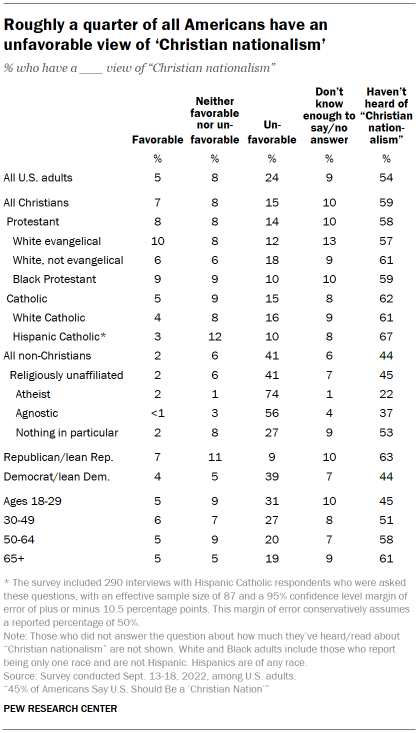
In every religious group analyzed in the survey, 10% or fewer say they have a favorable view of Christian nationalism. Atheists (74%) and agnostics (56%) are especially likely to have an unfavorable view of it.
Democrats are far more likely than Republicans to have an unfavorable view toward Christian nationalism (39% vs. 9%). And younger Americans are more likely than older Americans to view Christian nationalism unfavorably.
The reasons for Americans’ opinions toward Christian nationalism become clearer in light of their understandings of Christian nationalism. Respondents who said they had heard or read at least a little about Christian nationalism were asked the open-ended question, “In your own words, what does the phrase ‘Christian nationalism’ mean to you?” In general, those with differing feelings toward Christian nationalism express different ideas about what the concept means.
Overall, 13% of U.S. adults offer explanations of Christian nationalism that involve Christianity playing a dominant and institutionalized role in society – for example, basing American governance and laws on Christian beliefs and principles, or establishing a theocracy. Respondents in this category describe Christian nationalism as wanting America to be an “officially Christian nation” made of Christian people, “imposing Christian beliefs on American citizens,” giving Christianity a “privileged” place over other identities, or “excluding” or “persecuting” non-Christians.
These views are most prevalent among Americans with unfavorable opinions toward Christian nationalism, with 42% in this group describing Christian nationalism in this way. One respondent defines Christian nationalism as “elevating one religion above another. It is making this a theocracy and not giving people freedom to practice their religion or giving them freedom from religion. It is dangerously wrapping one religion and love for America together. It is weaponizing the flag.” Another describes the concept as “a group of people who not only want to impose their religious views on you through policies and laws, but also feel if they don’t get their way they are somehow being discriminated against. And they view their religious views as patriotic, which is asinine.” One of the more detailed responses, which captures the sentiments of several respondents with unfavorable views, claims:
“Christian nationalism is the belief that a nation should become a theocracy whose leaders all practice publicly the tenets of a single, lobotomized interpretation of Christianity – a creed wielded by its government as a means of social control and manipulation. Religion and nation fuse in the minds of its leaders, transcend all other concerns, then crush all opposition, foreign and domestic. Faith, fear and rage reign as one.”
As conveyed in the above quote, 2% of all Americans say that Christian nationalism is essentially a tool strategically used by leaders to help appeal to American citizens or to help certain Americans justify their political views. In their telling, it involves using familiar beliefs, concepts and phrases from Christianity as a cover-up for what are really sociopolitical attitudes. One respondent explains that Christian nationalism is “a political movement that uses Christian values as camouflage” and another calls it “totally wrapping up political behavior in religious clothes.” Another 2% of Americans describe Christian nationalism as the blending or mixing up of faith and politics so that they are indistinguishable.
Some U.S. adults – again, particularly those with unfavorable views of Christian nationalism – also describe Christian nationalism using other negative attributes. These include: “radical” or “extremist,” “hypocritical,” “cult”-like or “fanatical,” “fascist” or “authoritarian,” “misogynistic,” “hateful” or “angry,” “ignorant,” “anti-democratic,” and “[falsely] believing they are under attack.” This group makes up 30% of those with unfavorable attitudes toward Christian nationalism.
This also includes 3% of all Americans (13% of those with negative attitudes toward Christian nationalism) who describe Christian nationalism as White supremacist and racist. One respondent says Christian nationalism means “White dudes who are scared to lose power to women and minorities hiding behind a Bible they don’t even believe in to retain power.”
A similar share of U.S. adults (3%) describe Christian nationalism as the positive influence of faith and morals in society, with roots in Christianity. This view is especially common among those with a positive impression of Christian nationalism (27%). People in this category tend to view the Christian faith as a general “guide” for society, and say Christian nationalism connotes values, such as “family,” “unity” and “fellowship and goodwill to all.” One respondent describes Christian nationalism as “patriotic Christians who believe in God, family and country, morality and kindness.” Another respondent describes it as “a national consciousness centered on biblical precepts.”
A small share of the public (2%) – including 9% of those with favorable views of Christian nationalism – describe Christian nationalism with reference to the idea that America was founded as a Christian nation and has always had a distinct Christian heritage. For some, this includes America being favored by God. One of the more detailed responses states:
“It is the belief that the American nation is, and has always been, defined by and identified with Christianity, and the government should take an active role to hold on to that truth. Instead, our elected leaders – at all levels – have bowed to cultural, societal change, removing Christian principles from our daily life. How’s that working out? Gun violence is rampant, total disregard for traditional families, by which the trickle-down effect is gender confusion, rampant mental illness and fatherless homes where babies are taught to have more babies. Kick God out of school and look what you get. The ills of this nation today lie almost entirely at the doorstep of the liberal Democratic Party.”
Finally, a small number of respondents (fewer than 1%) claim that Christian nationalism is a concept made up by liberals and/or the media to insult Christians. One respondent says that Christian nationalism is “some gobbledygook made up by progressives trying to create a boogeyman that they hope most people will fear.” Another calls it a “derogatory term used by the left to push their White supremacy conspiracy theories.” And a respondent who views Christian nationalism favorably says that “Christian nationalism these days is a political term used to vilify anything with a slight Christian lean by those who oppose Christianity in general when America itself was founded on the ‘word of God.’”
One respondent conveys how Christian nationalism is used as a tool by American citizens and leaders on both the political left and right:
“It seems to be an inappropriate mixing of faith and governance in the imagination of those who cannot stand our previous president. The evangelical right has gotten too enamored with political influence, which the political right is happy to exploit. The progressive left uses the term as a pejorative to denigrate the Trump wing implying that only religious leftists are suitable for involvement in national politics. It seems mostly a lie used for political advantage. Which is sort of how politics works.”
Respondents also associate Christian nationalism with particular groups and public figures. Those mentioned include: conservatives and the right wing, evangelicals, fundamentalist Christians, Republicans, former President Donald Trump and the “MAGA cult,” and Southerners. A handful of respondents also suggest that Christian nationalism is a newly emerging party or group of its own.
As with Americans’ views of “Christian nation,” ambiguity is a recurrent theme throughout respondents’ descriptions of Christian nationalism. Their views fall along a spectrum, from strict theocratic rule on one end to a loose embrace of morals, such as helping others, on the other end. It is often unclear exactly how much control and influence Christianity has in their descriptions. For example, respondents describe Christian nationalism as “living under the beliefs of Christian values,” “religion having a major impact on the political process,” and “the promotion of Christian ideals within the political sphere.”
Though Americans with unfavorable views of Christian nationalism often describe it in a dominant way and those with favorable views often describe it as a positive influence, sometimes their views transcend these categories. For example, a considerable portion of those with favorable views of Christian nationalism describe it as a form of Christian dominance in society (11%).
In addition to the 55% of Americans who are unfamiliar with the concept of Christian nationalism (or declined to say whether they have heard of it), 18% say they have heard at least a little about it but also say they do not know how to describe Christian nationalism, and an additional 2% give answers too ambiguous to understand.
